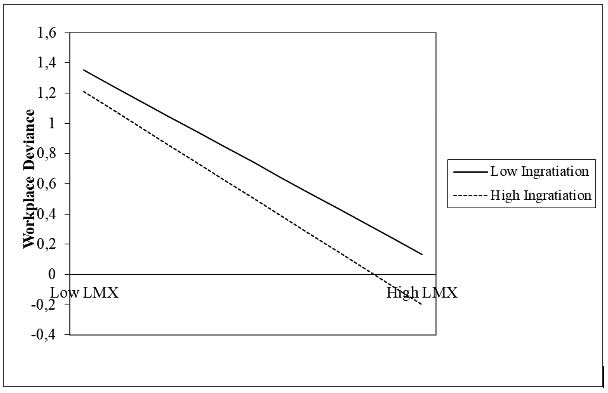It’s Not the Flattery, It’s the Relationship: Rethinking LMX and Workplace Deviance through Ingratiation
DOI:
https://doi.org/10.38043/jimb.v10i1.6426Keywords:
Leader-member exchange, Workplace deviance, Ingratiation, Impression , Management Theory, Social Exchange TheoryAbstract
This study examines the moderating role of ingratiation in the relationship between Leader–Member Exchange (LMX) and workplace deviance. While prior research has consistently demonstrated that high-quality LMX reduces deviant workplace behavior through increased trust and mutual support, limited attention has been given to how impression management tactics, such as ingratiation, may influence this relationship. Drawing on a quantitative approach, the study analyzes data from (395) employees across diverse industries in Indonesia. The results indicate that ingratiation significantly moderates the effect of LMX on workplace deviance. Specifically, the negative association between LMX and deviance becomes stronger when ingratiation is high. This finding challenges the conventional assumption that ingratiation is inherently dysfunctional and suggests instead that, in the context of strong leader–subordinate relationships, its potentially negative effects can be socially regulated. The study contributes to the literature by positioning ingratiation not only as a behavioral risk but also as a contextual trigger that activates LMX's adaptive control function. Practically, the findings underscore the importance of strengthening high-quality workplace relationships while managing political behavior as part of developing a constructive and ethical organizational culture.
Downloads
References
Ahmad, R., Nawaz, M. R., Ishaq, M. I., Khan, M. M., & Ashraf, H. A. (2023). Social exchange theory: Systematic review and future directions. Frontiers in Psychology, 13(January), 113. https://doi.org/10.3389/fpsyg.2022.1015921
Aiken, L.H.; Sermeus, W.; Smith, H.L.; Kutney-Lee, A.; van den Heede, K.; Sloane, D.M.; Busse, R.; McKee, M.; Bruyneel, L.;Rafferty, A.M.; et al. Patient safety, satisfaction, and quality of hospital care: Cross sectional surveys of nurses and patients in 12 countries in Europe and the United States. BMJ 2012, 344, e1717.
Asadullah, M. A., & Musaddiq, M. (2016). Effect of ingratiation on supervisor satisfaction through helping behavior: A moderated mediation model. 12(5), 11571191.
Azeem, M. U., De Clercq, D., & Haq, I. U. (2021). Suffering doubly: How victims of coworker incivility risk poor performance ratings by responding with organizational deviance, unless they leverage ingratiation skills. Journal of Social Psychology, 161(1), 86102. https://doi.org/10.1080/00224545.2020.1778617
Bennett, R. J., & Robinson, S. L. (2000). Development of a Measure of Workplace Deviance. 85(3), 349360.
Blau, P. M. (1964). Exchange and power in social life. New York, NY:Wiley.
Bolino, M., Long, D., & Turnley, W. (2016). Impression Management in Organizations: Critical Questions, Answers, and Areas for Future Research. Annual Review of Organizational Psychology and Organizational Behavior, 3(April), 377406. https://doi.org/10.1146/annurev-orgpsych-041015-062337
EK, I. (2021). a New Consequence of Leader-Member-Exchange: Impression Management Tactics. neri Dergisi, 16(56), 740768. https://doi.org/10.14783/maruoneri.805098
de Bruijn, A. L. (2021). Organizational Factors and Workplace deviance: Influences of Abusive Supervision, Dysfunctional Employees, and Toxic Work Environments. The Cambridge Handbook of Compliance, May, 639661. https://doi.org/10.1017/9781108759458.044
Fitriastuti, T., & Vanderstraeten, A. (2022). Being Out of the Loop: Workplace Deviance as a Mediator of the Impact of Impression Management on Workplace Exclusion. Sustainability, 14(2), 1004. https://doi.org/10.3390/su14021004
Fitriastuti, T., Larasatie, P., & Vanderstraeten, A. (2021). Please Like Me: Ingratiation as a Moderator of the Impact of the Perception of Organizational Politics on Job Satisfaction. International Journal of Environmental Research and Public Health, 18(14), 7455. https://doi.org/10.3390/ijerph18147455
Graen, G. B., & Uhl-bien, M. (1995). Relationship-based approach to leadership: Development of leader-member exchange (LMX ). Management Department Faculty Publications, 57(Lmx), 30.
Hayes, A.F. Introduction to Mediation, Moderation, and Conditional Process Analysis: A Regression-Based Approach; The Guilford Press: New York, NY, USA, 2013.Aiken & West (1991).
Jones, E. E. (1964). Ingratiation: a social psychological analysis. New York: Appleton-Century-Crofts.
Klotz, A. C., He, W., Yam, K. C., Bolino, M. C., Wei, W., & Houston, L. (2018). Good actors but bad apples: Deviant consequences of daily impression management at work. J Appl Psychol, 103(10), 1145-1154. doi:10.1037/apl0000335
Kumar, K., & Beyerlein, M. (1991). Construction and Validation of an Instrument for Measuring Ingratiatory Behaviors in Organizational Settings. Journal of Applied Psychology, 76(5), 619627. https://doi.org/10.1037/0021-9010.76.5.619
Liu, X., Wang, X., Zhao, Y., Xia, N., & Guo, S. (2020). Solving Workplace Deviant Behavior in Construction by LeaderMember Exchange and LeaderMember Guanxi . Journal of Construction Engineering and Management, 146(6). https://doi.org/10.1061/(asce)co.1943-7862.0001859
Liu, Z., & Liu, Q. (2024). Does LeaderMember Exchange (LMX) Ambivalence Influence Employees Constructive Deviance? Behavioral Sciences, 14(1). https://doi.org/10.3390/bs14010070
Mao, Y.; Liu, Y.; Jiang, C.; Zhang, I.D. Why am I ostracized and how would I react?A review of workplace ostracism research. Asia Pac. J. Manag. 2018, 35, 745767.
Mertens, S., Fitriastuti, T., Rys, M., & Schollaert, E. (2024). Ask no questions and hear no lies: the relationship between supervisor feedback-seeking and subordinates use of upward ingratiation tactics. Current Psychology. https://doi.org/10.1007/s12144-024-07012-2
Ni, H., Li, Y., Zeng, Y., & Duan, J. (2023). The double-edged sword effect of employee impression management and counterproductive work behavior: From the perspective of self-control resource theory. Frontiers in Psychology, 14. doi:10.3389/fpsyg.2023.1053784
Wu, L., Kwan, H. K., Wei, L., & Liu, J. (2013). Ingratiation in the Workplace: The Role of Subordinate and Supervisor Political Skill. September. https://doi.org/10.1111/joms.12033
Wulani, F., Handoko, T. H., & Purwanto, B. M. (2022). Supervisor-directed OCB and deviant behaviors: the role of LMX and impression management motives. Personnel Review, 51(4), 14101426. https://doi.org/10.1108/PR-06-2020-0406
Yan, M., Xie, Y. P., Zhao, J., Zhang, Y. J., Bashir, M., & Liu, Y. (2020). How Ingratiation Links to Counterproductive Work Behaviors: The Roles of Emotional Exhaustion and Power Distance Orientation. Front Psychol, 11, 2238. doi:10.3389/fpsyg.2020.02238

Downloads
Published
How to Cite
Issue
Section
License
Copyright (c) 2025 Nabilla Azzahra Sayidina, Triana Fitriastuti

This work is licensed under a Creative Commons Attribution-ShareAlike 4.0 International License.
